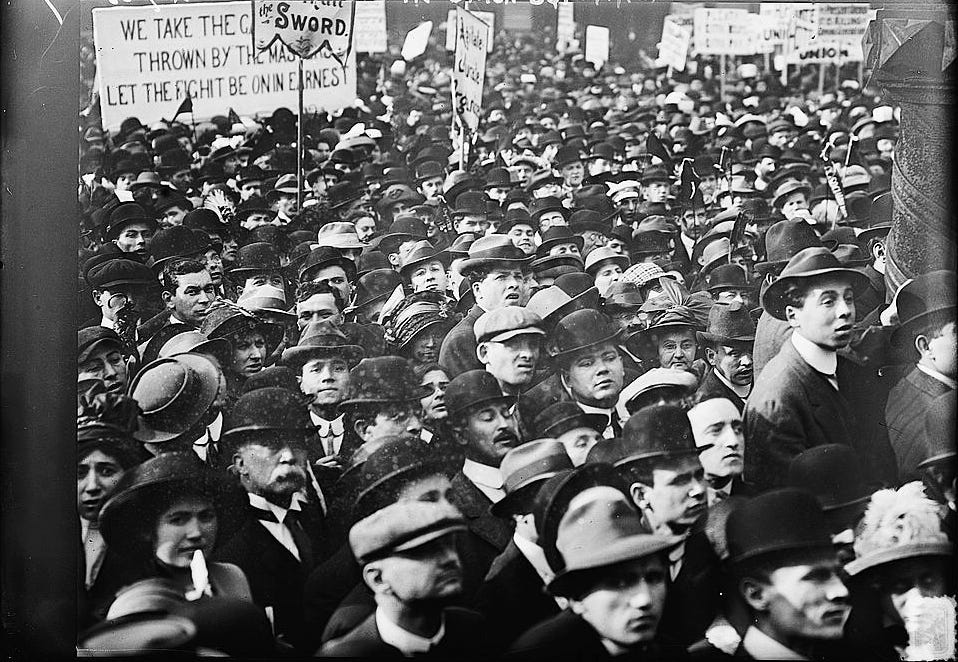Convicted Felon Nominated for Presidency
Could a criminal win America’s highest office? What's New in Old News, no. 14.
You might believe that the spectacle of a convicted felon running for the presidency marks a new low in American politics.
You would be wrong. It’s not the first time this has happened in our country. In 1908, at a New York nominating convention, an American political party named a felon as its standard bearer.
And his name wasn’t Trump.
In fact the young man’s name was Martin R. Preston, at that time a ward of the Nevada state penitentiary system. Martin—a union organizer for the International Workers of the World—was, depending on whom you asked, either an activist of deep-seated principles, a warrior for the rights of the oppressed working man, or a brutal thug.
The good people of Goldfield, Nevada, leaned toward the latter interpretation.
His case was controversial; only one fact went undisputed: on the evening of Sunday, March 10, 1907, Preston scuffled with John Silva, owner of a Goldfield restaurant. Silva opposed organized labor and had offered free meals to workers who refused to join the union.
Preston and some of his IWW comrades chose to picket the restaurant, convincing potential patrons to dine elsewhere. Silva confronted the union men. Angry words were exchanged. Then—and once again the story forked—Silva either drew a pistol and pointed it at Preston’s head, or had simply stood outside his restaurant while Preston drew his pistol and fired twice.
The conflict’s outcome was not disputed: Silva received one bullet in his hand; the second lodged near his heart. He died a few hours later at the county hospital.
Was Martin Preston a cold-blooded killer or a man who had shot in self-defense? The citizens of Goldfield divided along the seam that the union had opened in the town. Ultimately, a jury of twelve men found Preston guilty of murder. An appeal for leniency induced the judge to impose a 25 year sentence rather than a quick hanging. Preston was bundled off to the penitentiary, another martyr for the working man’s cause.
Or possibly a presidential candidate.
1908 saw two men—William Howard Taft and William Jennings Bryan—nominated to run for the presidency. Neither candidate sparked enthusiasm; many wondered if this was the best America had to offer.
In a nation that hungered for fresh beef, the National Socialist Labor Party could serve as butcher. On the evening of July 5, 1908, convention delegate Daniel De Leon proposed labor martyr Martin Preston as the party’s candidate.
“I am now going to nominate an honest workingman,” thundered De Leon, “not a professional workingman; a man who has been in the front ranks of workingmen and who is now in jail. The name of that man is Martin R. Preston, and he is now serving a jail sentence in Goldfield, Nev., for conduct that is honorable and which no workingman should be ashamed of.”
De Leon’s lengthy speech praised Preston’s defense of union workers; his shots were fired in self-defense. Tested in the fires of a corrupt justice system, Preston had not flinched. He was a man of proven integrity, worth to carry the party’s banner from prison. If he defeated his rivals, the will of the people would see him released and transferred to the White House.
The nominating convention delegates went wild; Martin Preston was their man.
Unfortunately, De Leon had failed to check with the candidate before the nomination. A telegram arrived the following day in which Preston declined the honor. His lawyer, who was working to appeal the conviction, advised him to avoid the attention that a presidential campaign would bring. Martin chose to follow his attorney’s guidance.
This decision the supporters who had placed faith in him. “Preston has clearly shown he has no backbone,” said one of the Socialist delegates. “If he had the proper kind of courage he would have accepted [the nomination] as a matter of principle.”
Brave words from a man who wasn’t serving twenty-five years for the union cause.
Nevertheless, the unexpected rejection threw the Socialist Labor Party into disarray. What would they do without a candidate?
Run him anyway—refuse to take “no” for an answer. Ten days after Martin Preston’s nomination, the party claimed that they had not received an “official” telegram from the convict, and thus emboldened, would proceed with the campaign.
“To-day,” declared a press release from party headquarters, “the compact battalion of the Socialist Labor party, with Preston and Munro inscribed on its banner, takes it stand, intrepid, on the field of this year’s Presidential contest, cheered by the howls emitted by the manifold foe.”
Theirs was a fleeting victory—an “official” telegram from Nevada brought a second trenchant refusal from candidate Preston. He absolutely would not stand.
Denied a second time, the party reluctantly swapped their standard bearer for the less-inspiring August Gillhaus, a New York engineer. On election day, William Howard Taft won the US presidency with 7,678,335 votes; August Gillhaus trailed by a few percentage points with only 14,031 votes cast for the Socialist Labor party.
Perhaps the workers would have done better with a convict as their candidate.
Thanks for reading this week’s installment of What’s New in Old News? If you enjoy these weekly stories from the past, why not help spread the word? Share this with a friend:




14,000 votes for a man in prison, and who said 'no' twice, isn't bad. Unfortunately, our current felon, who is running on his own accord, will garner many more votes than he rightly deserves.